2022届高考英语二轮复习:动名词详解(形式、构成与特征、功能) 学案
文档属性
| 名称 | 2022届高考英语二轮复习:动名词详解(形式、构成与特征、功能) 学案 | 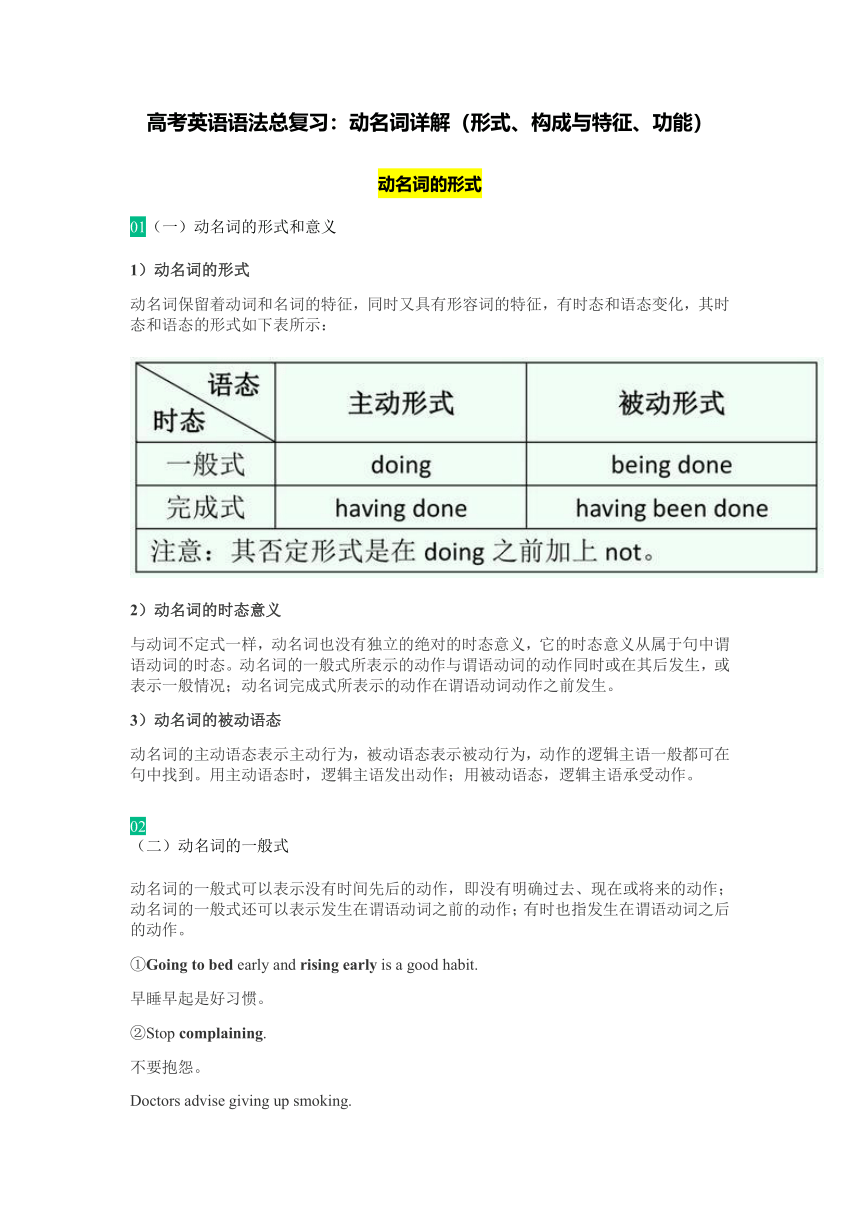 | |
| 格式 | doc | ||
| 文件大小 | 208.5KB | ||
| 资源类型 | 教案 | ||
| 版本资源 | 通用版 | ||
| 科目 | 英语 | ||
| 更新时间 | 2021-11-20 21:52:51 | ||
图片预览

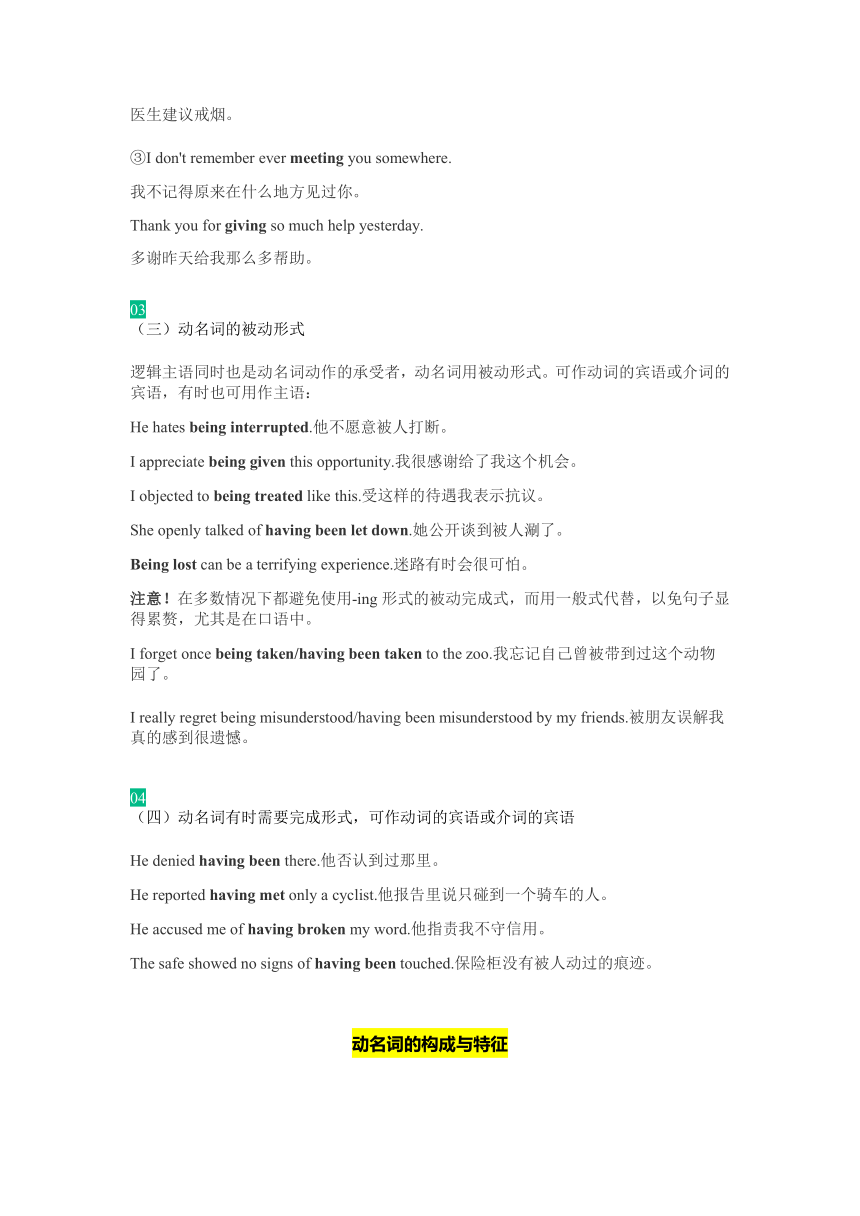
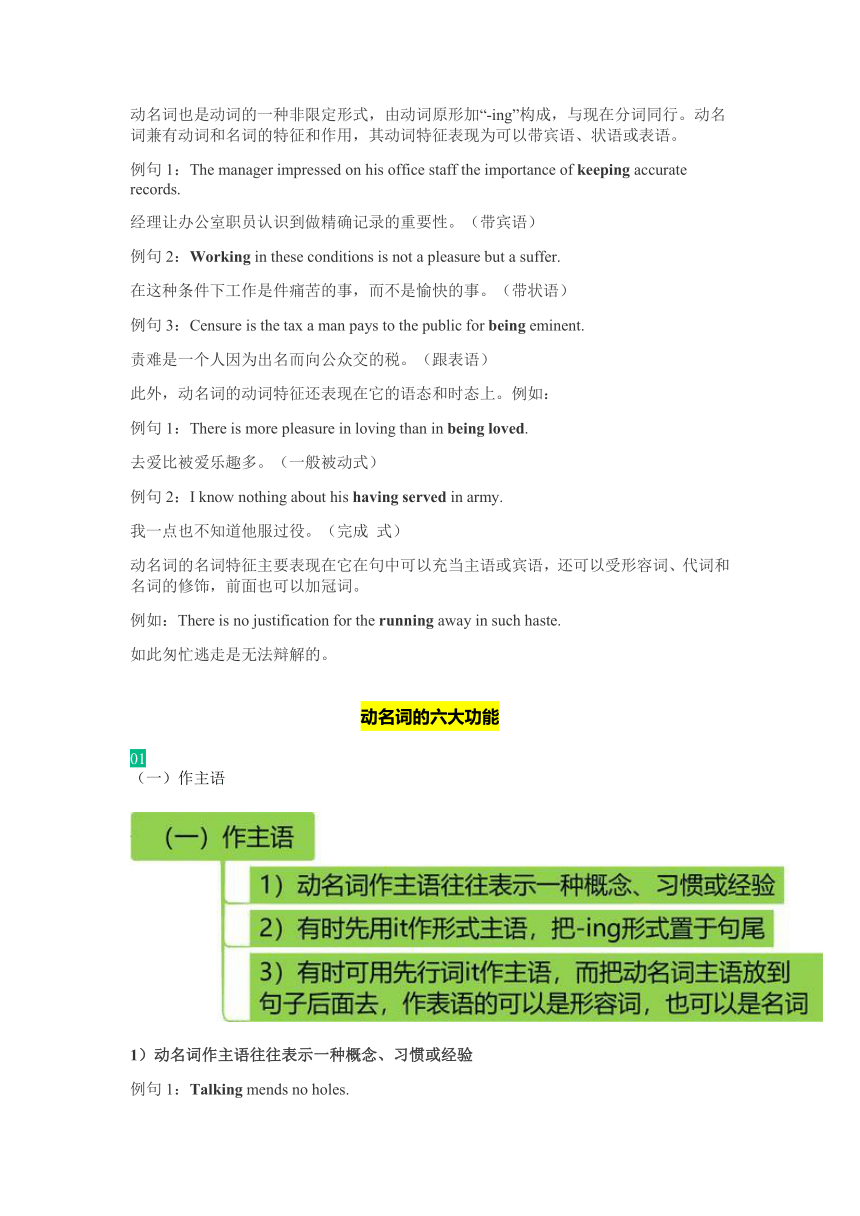
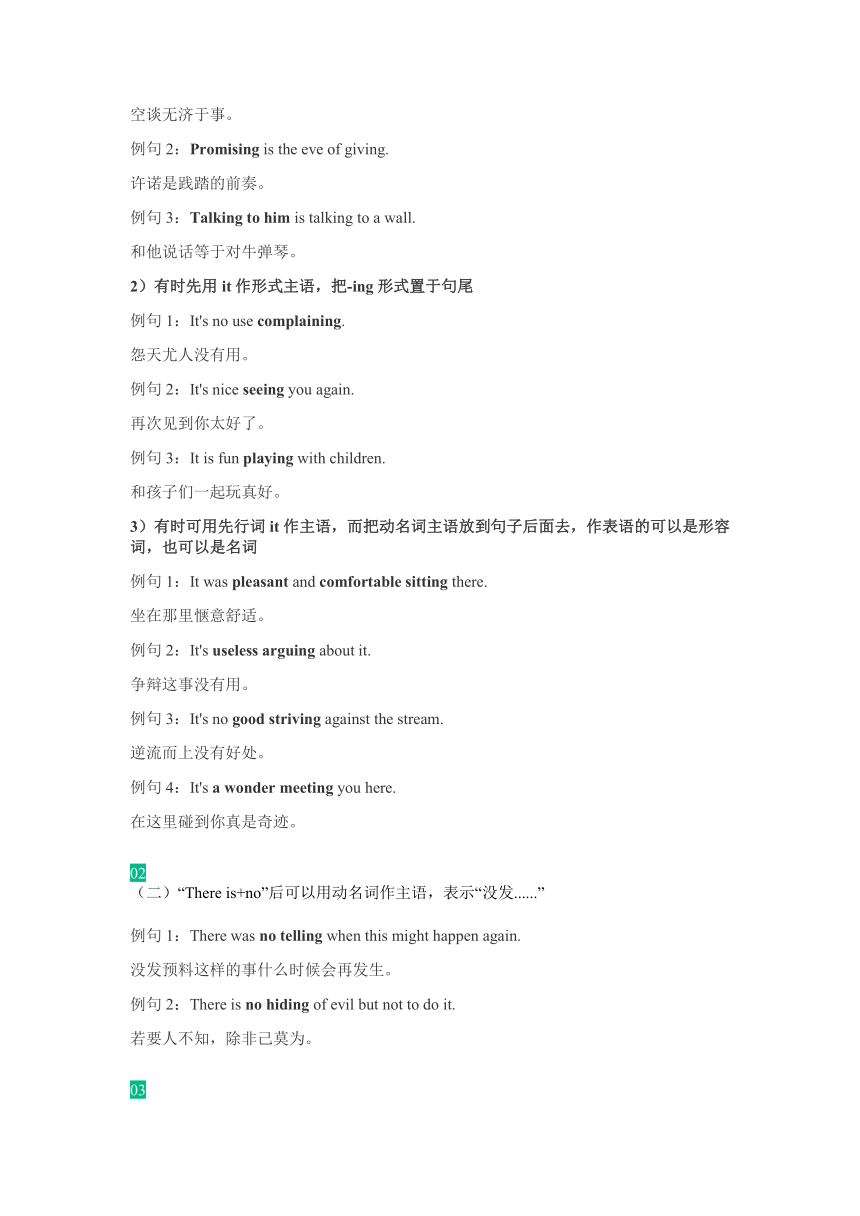
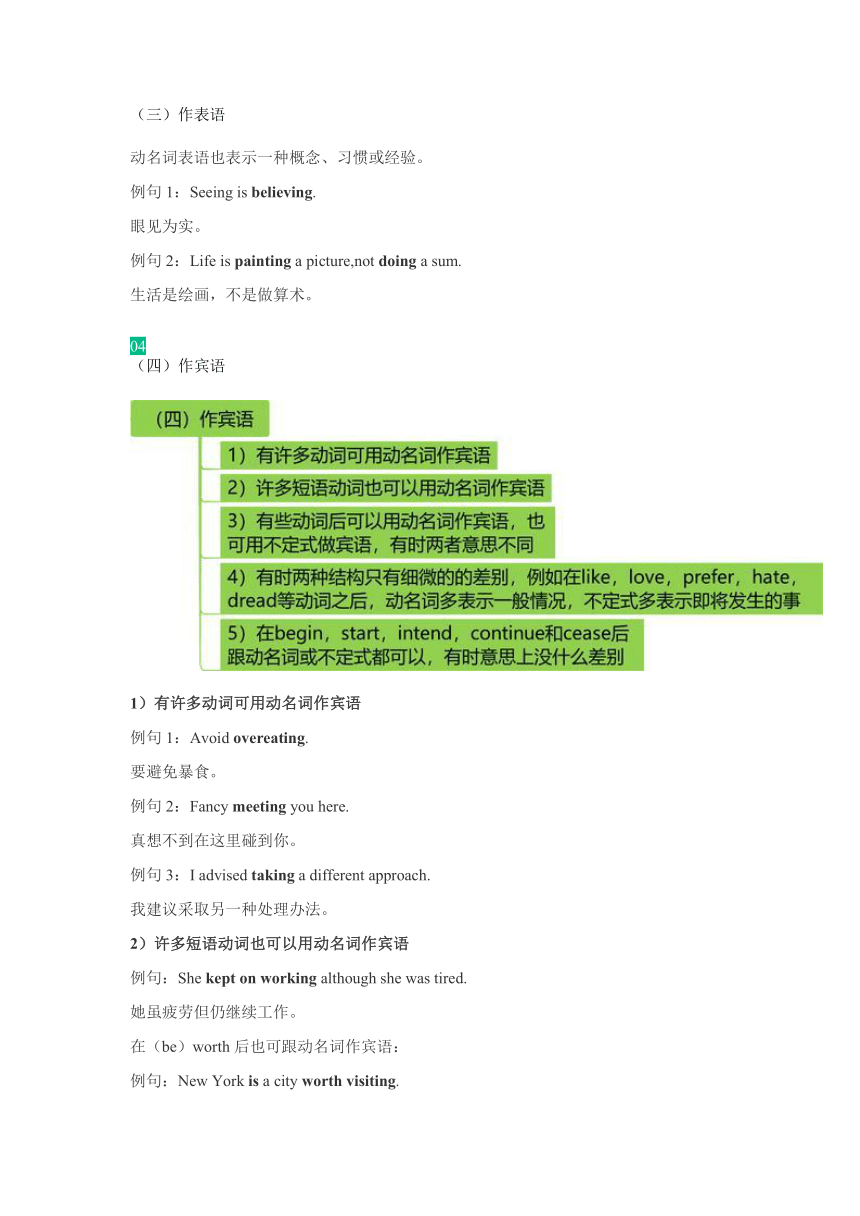
文档简介
高考英语语法总复习:动名词详解(形式、构成与特征、功能)
动名词的形式
01(一)动名词的形式和意义
1)动名词的形式
动名词保留着动词和名词的特征,同时又具有形容词的特征,有时态和语态变化,其时态和语态的形式如下表所示:
2)动名词的时态意义
与动词不定式一样,动名词也没有独立的绝对的时态意义,它的时态意义从属于句中谓语动词的时态。动名词的一般式所表示的动作与谓语动词的动作同时或在其后发生,或表示一般情况;动名词完成式所表示的动作在谓语动词动作之前发生。
3)动名词的被动语态
动名词的主动语态表示主动行为,被动语态表示被动行为,动作的逻辑主语一般都可在句中找到。用主动语态时,逻辑主语发出动作;用被动语态,逻辑主语承受动作。
02
(二)动名词的一般式
动名词的一般式可以表示没有时间先后的动作,即没有明确过去、现在或将来的动作;动名词的一般式还可以表示发生在谓语动词之前的动作;有时也指发生在谓语动词之后的动作。
①Going to bed early and rising early is a good habit.
早睡早起是好习惯。
②Stop complaining.
不要抱怨。
Doctors advise giving up smoking.
医生建议戒烟。
③I don't remember ever meeting you somewhere.
我不记得原来在什么地方见过你。
Thank you for giving so much help yesterday.
多谢昨天给我那么多帮助。
03
(三)动名词的被动形式
逻辑主语同时也是动名词动作的承受者,动名词用被动形式。可作动词的宾语或介词的宾语,有时也可用作主语:
He hates being interrupted.他不愿意被人打断。
I appreciate being given this opportunity.我很感谢给了我这个机会。
I objected to being treated like this.受这样的待遇我表示抗议。
She openly talked of having been let down.她公开谈到被人涮了。
Being lost can be a terrifying experience.迷路有时会很可怕。
注意!在多数情况下都避免使用-ing形式的被动完成式,而用一般式代替,以免句子显得累赘,尤其是在口语中。
I forget once being taken/having been taken to the zoo.我忘记自己曾被带到过这个动物园了。
I really regret being misunderstood/having been misunderstood by my friends.被朋友误解我真的感到很遗憾。
04
(四)动名词有时需要完成形式,可作动词的宾语或介词的宾语
He denied having been there.他否认到过那里。
He reported having met only a cyclist.他报告里说只碰到一个骑车的人。
He accused me of having broken my word.他指责我不守信用。
The safe showed no signs of having been touched.保险柜没有被人动过的痕迹。
动名词的构成与特征
动名词也是动词的一种非限定形式,由动词原形加“-ing”构成,与现在分词同行。动名词兼有动词和名词的特征和作用,其动词特征表现为可以带宾语、状语或表语。
例句1:The manager impressed on his office staff the importance of keeping accurate records.
经理让办公室职员认识到做精确记录的重要性。(带宾语)
例句2:Working in these conditions is not a pleasure but a suffer.
在这种条件下工作是件痛苦的事,而不是愉快的事。(带状语)
例句3:Censure is the tax a man pays to the public for being eminent.
责难是一个人因为出名而向公众交的税。(跟表语)
此外,动名词的动词特征还表现在它的语态和时态上。例如:
例句1:There is more pleasure in loving than in being loved.
去爱比被爱乐趣多。(一般被动式)
例句2:I know nothing about his having served in army.
我一点也不知道他服过役。(完成 式)
动名词的名词特征主要表现在它在句中可以充当主语或宾语,还可以受形容词、代词和名词的修饰,前面也可以加冠词。
例如:There is no justification for the running away in such haste.
如此匆忙逃走是无法辩解的。
动名词的六大功能
01
(一)作主语
1)动名词作主语往往表示一种概念、习惯或经验
例句1:Talking mends no holes.
空谈无济于事。
例句2:Promising is the eve of giving.
许诺是践踏的前奏。
例句3:Talking to him is talking to a wall.
和他说话等于对牛弹琴。
2)有时先用it作形式主语,把-ing形式置于句尾
例句1:It's no use complaining.
怨天尤人没有用。
例句2:It's nice seeing you again.
再次见到你太好了。
例句3:It is fun playing with children.
和孩子们一起玩真好。
3)有时可用先行词it作主语,而把动名词主语放到句子后面去,作表语的可以是形容词,也可以是名词
例句1:It was pleasant and comfortable sitting there.
坐在那里惬意舒适。
例句2:It's useless arguing about it.
争辩这事没有用。
例句3:It's no good striving against the stream.
逆流而上没有好处。
例句4:It's a wonder meeting you here.
在这里碰到你真是奇迹。
02
(二)“There is+no”后可以用动名词作主语,表示“没发......”
例句1:There was no telling when this might happen again.
没发预料这样的事什么时候会再发生。
例句2:There is no hiding of evil but not to do it.
若要人不知,除非己莫为。
03
(三)作表语
动名词表语也表示一种概念、习惯或经验。
例句1:Seeing is believing.
眼见为实。
例句2:Life is painting a picture,not doing a sum.
生活是绘画,不是做算术。
04
(四)作宾语
1)有许多动词可用动名词作宾语
例句1:Avoid overeating.
要避免暴食。
例句2:Fancy meeting you here.
真想不到在这里碰到你。
例句3:I advised taking a different approach.
我建议采取另一种处理办法。
2)许多短语动词也可以用动名词作宾语
例句:She kept on working although she was tired.
她虽疲劳但仍继续工作。
在(be)worth后也可跟动名词作宾语:
例句:New York is a city worth visiting.
3)有些动词后可以用动名词作宾语,也可用不定式做宾语,有时两者意思不同
例句对比1:I'll never forget hearing Chaliapin singing in that opera.
我永远不会忘记听夏里亚宾在那部歌剧中的演唱。
He forgot to pay me.
他忘了付钱给我。
例句对比2:I couldn't help feeling jealous when she was promoted over my head.
她获提升后职位比我高,我压抑不住嫉妒的心情。
All this helped (to) raise farm yields.
这一切帮助提高了农业产量。
4)有时两种结构只有细微的的差别,例如在like,love,prefer,hate,dread等动词之后,动名词多表示一般情况,不定式多表示即将发生的事
例句对比1:I hate asking favors.我不愿意求人帮忙。
I would hate you to think I didn't care.很遗憾你认为我漠不关心。
例句对比2:I prefer walking alone.我比较喜欢一个人溜达。
We preferred to walk there.我们宁愿步行到那里。
有时两者可以换用,意思上没有差别:
例句1:He hate thinking/to think about it.
他不愿想这事。
例句2:She loves having/to have lots of young men round her.
她喜欢身边围绕着许多年轻男子。
例句3:She prefers being/to be alone.
她宁愿独自一人。
5)在begin,start,intend,continue和cease后跟动名词或不定式都可以,有时意思上没什么差别
例句1:She continued working/to work as if nothing had happened.
他继续干活,好像什么也没有发生。
例句2:They ceased talking/to talk and I began reading/to read.
他们停止了交谈,我开始看书。
有时有点细微的差别,在begin,start和cease后,不定式多表示情况变化,而动名词表示有意识地开始或停止:
例句1:Suddenly it started to rain.
天突然下起雨来。
例句2:The matter has ceased to be a mystery to us.
这事对我们不再是个谜。
例句:3:The factory has ceased making bicycles.
该厂已停止生产自行车。
在以-ing结尾的动词后不宜再用动名词,以避免-ing的重复:
例句1:It's starting to rain.
天开始下起雨来。
例句2:He was beginning to miss her.
他开始惦记她。
注意!Stop后面有时跟不定式,但它并不是宾语而是状语,用于说明stop的目的。
例句:He stopped to talk to us.
他停下来和我们说话。
比较:He stopped talking to us.
他停止和我们交谈。
常跟动名词作宾语的动词或短语有:
Admit承认,advise建议,allow允许,avoid避免,cannot help禁不住,can't stand经受不住,consider考虑,delay推迟,enjoy喜欢,finish完成,give up放弃,imagine想象,include包括,keep保持,keep on持续,mind介意,miss错过,put off推迟,permit允许,practise联系,resist抵抗,suggest建议
05
(五)做介词的宾语
1)有许多由介词构成的成语动词后可以跟动名词作宾语
例句1:Goodness consists in being honest.
善良主要在于诚实。
例句2:What we should aim at producing is men who possess both culture and expert knowledge in some special direction.
我们教书育人的目的就是要培养同时具备文化修养和专业知识的人才。
2)还有不少“be+形容词+介词”的结构后也常可用动名词作宾语
例句1:He wasn't keen on buying a car.
他并不着急买车。
例句2:He's quite capable of lying to get out of trouble.
他很会蒙混过关。
3)在“及物动词+宾语+介词”这类结构后,也常可跟动名词作宾语
例句1:She charged me with neglecting my duty.
她指控我玩忽职守。
例句2:She dedicated her life to helping the poor.
她毕生致力于帮助穷人。
4)在How about后也常用动名词作宾语
例句:How about coming with us to the club
跟我们一起去俱乐部怎么样?
5)许多介词可以跟动名词构成状语
例句1:And,in doing so,he fell into contradiction.
而且,这样做时,他陷入了矛盾之中。
例句2:By going down into the river,you'll know its depth;by taking a bite of pear,you'll know its taste.
亲身下河知深浅;亲口尝梨知酸甜。
6)还有一些由介词构成的短语,后面可跟动名词作宾语
例句1:Guests can relax in the lounge prior to enteringthe theater.
客人在进入剧场之前可以在休息厅放松一下。
例句2:We bought the cottage with a view to movingthere after we retired.
我们买了一处小木屋,打算退休后搬去住。
7)有些介词可以和动名词构成定语
例句1:He invented a new process of dyeing.
他发明了一种染色新工艺。
例句2:The bank has introduced a new method of calculating the interest on loans.
银行推行了一种计算贷款利率的新方法。
8)有时介词也可和动名词一道构成表语
例句1:I'm for doing nothing till the police arrive.
我主张在警察到来前不要采取任何行动。
例句2:Talking to her was like playing on an exquisite violin.
和她谈话就像弹奏一把美妙的提琴。
下列均为动介结构,其后如果出现非谓语形式,只能为动词-ing形式,其中的to都是介词,而不是不定式符号。
Add up to结果是
Admit to承认
Be/get/become used to习惯于
Be equal to等于
Get down to开始
Devote...to把......献给
Look forward to期待
Object to反对
Stick to坚持
Take to开始
See to注意,处理
Lead to导致
Pay attention to注意
06
(六)作宾语补足语
动名词可以作某些动词如mind、imagine、suggest、insist on等的宾语补足语。
例句1:Do you mind me/my sitting here
你介意我坐在这里吗?
例句2:He suggested the government taking necessary measures to reduce the cost.
他建议政府应该采取必要的措施来降低成本。
动名词的逻辑主语
详细讲解如下:
动名词的逻辑主语多用一个物主代词或名词所有格表示。带有逻辑主语的动名词形式称为动名词的复合结构。当动名词的逻辑主语与句子的主语不一致时,要在动名词之前加上物主代词或名词所有格,这便构成了动名词的复合结构。
1)名词所有格形式
其中物主代词(名词所有格)是逻辑上的主语,动名词是逻辑上的谓语。动名词复合结构在句中可作主语、宾语、表语、状语等,分别相当于一个主语从句、宾语从句、表语从句、状语从句。
例句1:John's having seen her did not make her worried.
约翰看见了她,这并没有使她不安。
例句2:Her coming to help encouraged all of us.
她来帮忙鼓舞了我们。
2)普通格形式
①逻辑主语是有生命的名词时,用名词或代词所有格(作主语时,其逻辑主语只用所有格,若作宾语,逻辑主语也可用普通格)。
例句1:Mary's being ill made her mother upset.
玛丽病了,这使她妈妈很着急。(不可用Mary)
例句2:Would you mind my/me using your telescope
你介意我用一下你的望远镜吗?
②逻辑主语是无生命的名词或抽象概念名词时,只用普通格。
例句:He is in the belief of money being everything.
他相信money就是一切。
③逻辑主语是以s结尾的名词或是以一个以上名词构成的词组,只用普通格。
例句1:The glory of the marshal counts on many soldiers dying on the battlefield.
一将功成万骨灰。
例句2:I'm astonished at Mary and Henry getting married.
我很惊讶玛丽和亨利竟然结婚了。
④逻辑主语是数词、指示代词或不定代词this、that、somebody、someone、nobody、none、anybody、anyone时,一般用普通格。
例句:This can't be said without someone getting angry.
这话说出来非得得罪人不可。
注意!①现在分词作宾语补足语时,其逻辑主语只能用物主代词或名词(即普通格),不能用其所有格。
例如:I dislike him/his coming without a ring in advance.
我讨厌他不提前打个电话就来了。
coming是的代名词,其逻辑主语用him或his均可。
②动名词的逻辑主语用作介词with的宾语时,应该用普通格。
例如:It was s cosy room with a fan spinning overhead.
这是一间舒适的房间,风扇在上空盘旋着。
动名词构成的两类合成词
01
1)许多合成词由“动名词+名词”构成
在这个合成词中,动名词表示一种特殊的目的。
A swimming pool游泳池
例句:They are girls who have never been in a swimming pool or on a swing.
她们都是一些从没有去过游泳池、没荡过秋千的女孩。
A walking stick拐杖
例句:He is slower than a snail and uses a walking stick.
他行动起来比蜗牛还慢,总是拄着拐杖走路。
A reading room阅览室
例句:They transformed the basement into a reading room.
他们把地下室改建成阅览室。
A bathing cap浴帽
例句:You have to wear a bathing cap in the pool.
不可以围着毛巾进浴池。
A changing room更衣室
例句:There are following facilities on the beach: a shower, a restroom, and a changing room.
这些就是沙滩上仅有的一些设施:冲浴室,洗手间,还有一个更衣室
A waiting room等候室,候诊室
例句:Doctors usually have a waiting room full of patients and a limited amount of time they can spend with each individual patient.
医生通常有一屋子的病人等候,只有有限的时间与他们每个病人讨论。
A watering can喷壶
例句:Use a watering can to let hair keep homogeneous humidity as far as possible.
尽可能使用喷壶让头发保持均匀的湿度。
A guessing game猜字游戏
例句:It's a guessing game.
这有点像猜谜游戏。
An ironing board熨衣板
例句:This table is convertible into an ironing board.
这个桌子是可转变的,而成烫衣板。
A collecting tin募捐箱
例句:I have a collecting tin.
我有一个储蓄罐。
A hiding place藏身处
例句:Hide it in a hiding place where no one ever goes.
把它藏在没有人的隐秘处。
A racing bicycle赛车
例句:Dean has a mountain bike, but he wants to buy a racing bicycle to ride in the city.
迪恩有辆登山自行车,但是他想买一辆竞速自行车在市区骑。
02
2)还有一类合成词由“形容词(名词)+动名词”构成
Physical training体育(锻炼)
例句:Physical training is an essential part of soldiers' life.
体能训练是大兵们生活中最基本的部分。
Job-hunting找工作
例句:A few leavers will be lucky enough to get some job-hunting assistance from their former employers.
一些幸运的离开者在求职时将会得到原老板的一些帮助。
Weightlifting举重(运动)
例句:The weightlifting built up his body.
举重增强了他的体质。
Sightseeing观光
例句:After a day of sightseeing, take in a musical or play in one of the world renowned Broadway Theaters.
游览一天后,你可以在世界享有生命的百老汇歌剧院听音乐会或看戏剧。
Window-shopping浏览商店橱窗
例句:Well… How about going window-shopping
嗯……去商店随便逛逛怎么样?
Tap dancing踢踏舞
例句:Tap dancing, look at their special shoes!
踢踏舞,看看他们的鞋子都很特别的。
有些动名词已成为名词,有些为不可数名词:
Boating划船
例句:Some girls are found boating in the lake.
有人看到一些女孩在湖里划船。
Bowling保龄球
例句:After the collision, the bowling ball continues unaltered.
在碰撞之后,保龄球继续不受影响。
Yachting乘坐游艇
例句:It was later sold for millions, allowing him to move into the yachting business.
将其以数百万卖掉后,便转向游艇生意。
Surfing冲浪
例句:Yes, I often went surfing with my father before.
是的,我以前经常跟我爸爸去冲浪。
Dancing跳舞
例句:We banked up the games by singing and dancing.
游戏完后我们唱歌跳舞以助余兴。
Mountaineering登山
例句:What`s the Mountaineering Club doing this weekend
这个周末登山俱乐部有何活动
有些为可数名词:
Painting画
例句:He gave me a painting with his name subscribed.
他送给我一张他亲笔署名的绘画。
Saying俗话
例句:She blinked away her tears saying nothing.
她眨着眼挤泪珠,没说什么。
Warning警告
例句:Several cars piled up after ignoring the fog warning on the motorway.
由于无视高速公路上的大雾警告,有好几辆汽车相撞。
Meaning意思
例句:He looked at me with meaning.
他意味深长地看着我。
Ending结局
例句:But there is no ending.
事实上结局是没有的。
Feeling感觉
例句:A high ceiling gives a feeling of airiness and spaciousness.
天花板高给人一种通风和宽敞的感觉。
有些甚至经常以复数形式出现:
Findings调查结果
例句:But the findings do not apply to energy burnt up by exercise.
但是这些发现并不适用于通过锻炼而燃烧的能量。
Savings积蓄
例句:We shall have to break into our savings to buy the house.
我们可要动用我们储蓄的钱去买房子。
Surroundings环境
例句:Today's computers, in contrast, have no idea of their location and surroundings.
今天的电脑,与此相反,并不知道它们的位置和环境。
Sufferings苦难
例句:She masked her sufferings with a cheerful smile.
她用欢快的笑容掩盖了内心的痛苦。
Earnings挣的钱
例句:Last year there was a 20% decrease in his earnings.
去年他的收入减少了20%。
Belongings财物
例句:I needed to sort my belongings.
我需要的把我的财产分类。
动名词的形式
01(一)动名词的形式和意义
1)动名词的形式
动名词保留着动词和名词的特征,同时又具有形容词的特征,有时态和语态变化,其时态和语态的形式如下表所示:
2)动名词的时态意义
与动词不定式一样,动名词也没有独立的绝对的时态意义,它的时态意义从属于句中谓语动词的时态。动名词的一般式所表示的动作与谓语动词的动作同时或在其后发生,或表示一般情况;动名词完成式所表示的动作在谓语动词动作之前发生。
3)动名词的被动语态
动名词的主动语态表示主动行为,被动语态表示被动行为,动作的逻辑主语一般都可在句中找到。用主动语态时,逻辑主语发出动作;用被动语态,逻辑主语承受动作。
02
(二)动名词的一般式
动名词的一般式可以表示没有时间先后的动作,即没有明确过去、现在或将来的动作;动名词的一般式还可以表示发生在谓语动词之前的动作;有时也指发生在谓语动词之后的动作。
①Going to bed early and rising early is a good habit.
早睡早起是好习惯。
②Stop complaining.
不要抱怨。
Doctors advise giving up smoking.
医生建议戒烟。
③I don't remember ever meeting you somewhere.
我不记得原来在什么地方见过你。
Thank you for giving so much help yesterday.
多谢昨天给我那么多帮助。
03
(三)动名词的被动形式
逻辑主语同时也是动名词动作的承受者,动名词用被动形式。可作动词的宾语或介词的宾语,有时也可用作主语:
He hates being interrupted.他不愿意被人打断。
I appreciate being given this opportunity.我很感谢给了我这个机会。
I objected to being treated like this.受这样的待遇我表示抗议。
She openly talked of having been let down.她公开谈到被人涮了。
Being lost can be a terrifying experience.迷路有时会很可怕。
注意!在多数情况下都避免使用-ing形式的被动完成式,而用一般式代替,以免句子显得累赘,尤其是在口语中。
I forget once being taken/having been taken to the zoo.我忘记自己曾被带到过这个动物园了。
I really regret being misunderstood/having been misunderstood by my friends.被朋友误解我真的感到很遗憾。
04
(四)动名词有时需要完成形式,可作动词的宾语或介词的宾语
He denied having been there.他否认到过那里。
He reported having met only a cyclist.他报告里说只碰到一个骑车的人。
He accused me of having broken my word.他指责我不守信用。
The safe showed no signs of having been touched.保险柜没有被人动过的痕迹。
动名词的构成与特征
动名词也是动词的一种非限定形式,由动词原形加“-ing”构成,与现在分词同行。动名词兼有动词和名词的特征和作用,其动词特征表现为可以带宾语、状语或表语。
例句1:The manager impressed on his office staff the importance of keeping accurate records.
经理让办公室职员认识到做精确记录的重要性。(带宾语)
例句2:Working in these conditions is not a pleasure but a suffer.
在这种条件下工作是件痛苦的事,而不是愉快的事。(带状语)
例句3:Censure is the tax a man pays to the public for being eminent.
责难是一个人因为出名而向公众交的税。(跟表语)
此外,动名词的动词特征还表现在它的语态和时态上。例如:
例句1:There is more pleasure in loving than in being loved.
去爱比被爱乐趣多。(一般被动式)
例句2:I know nothing about his having served in army.
我一点也不知道他服过役。(完成 式)
动名词的名词特征主要表现在它在句中可以充当主语或宾语,还可以受形容词、代词和名词的修饰,前面也可以加冠词。
例如:There is no justification for the running away in such haste.
如此匆忙逃走是无法辩解的。
动名词的六大功能
01
(一)作主语
1)动名词作主语往往表示一种概念、习惯或经验
例句1:Talking mends no holes.
空谈无济于事。
例句2:Promising is the eve of giving.
许诺是践踏的前奏。
例句3:Talking to him is talking to a wall.
和他说话等于对牛弹琴。
2)有时先用it作形式主语,把-ing形式置于句尾
例句1:It's no use complaining.
怨天尤人没有用。
例句2:It's nice seeing you again.
再次见到你太好了。
例句3:It is fun playing with children.
和孩子们一起玩真好。
3)有时可用先行词it作主语,而把动名词主语放到句子后面去,作表语的可以是形容词,也可以是名词
例句1:It was pleasant and comfortable sitting there.
坐在那里惬意舒适。
例句2:It's useless arguing about it.
争辩这事没有用。
例句3:It's no good striving against the stream.
逆流而上没有好处。
例句4:It's a wonder meeting you here.
在这里碰到你真是奇迹。
02
(二)“There is+no”后可以用动名词作主语,表示“没发......”
例句1:There was no telling when this might happen again.
没发预料这样的事什么时候会再发生。
例句2:There is no hiding of evil but not to do it.
若要人不知,除非己莫为。
03
(三)作表语
动名词表语也表示一种概念、习惯或经验。
例句1:Seeing is believing.
眼见为实。
例句2:Life is painting a picture,not doing a sum.
生活是绘画,不是做算术。
04
(四)作宾语
1)有许多动词可用动名词作宾语
例句1:Avoid overeating.
要避免暴食。
例句2:Fancy meeting you here.
真想不到在这里碰到你。
例句3:I advised taking a different approach.
我建议采取另一种处理办法。
2)许多短语动词也可以用动名词作宾语
例句:She kept on working although she was tired.
她虽疲劳但仍继续工作。
在(be)worth后也可跟动名词作宾语:
例句:New York is a city worth visiting.
3)有些动词后可以用动名词作宾语,也可用不定式做宾语,有时两者意思不同
例句对比1:I'll never forget hearing Chaliapin singing in that opera.
我永远不会忘记听夏里亚宾在那部歌剧中的演唱。
He forgot to pay me.
他忘了付钱给我。
例句对比2:I couldn't help feeling jealous when she was promoted over my head.
她获提升后职位比我高,我压抑不住嫉妒的心情。
All this helped (to) raise farm yields.
这一切帮助提高了农业产量。
4)有时两种结构只有细微的的差别,例如在like,love,prefer,hate,dread等动词之后,动名词多表示一般情况,不定式多表示即将发生的事
例句对比1:I hate asking favors.我不愿意求人帮忙。
I would hate you to think I didn't care.很遗憾你认为我漠不关心。
例句对比2:I prefer walking alone.我比较喜欢一个人溜达。
We preferred to walk there.我们宁愿步行到那里。
有时两者可以换用,意思上没有差别:
例句1:He hate thinking/to think about it.
他不愿想这事。
例句2:She loves having/to have lots of young men round her.
她喜欢身边围绕着许多年轻男子。
例句3:She prefers being/to be alone.
她宁愿独自一人。
5)在begin,start,intend,continue和cease后跟动名词或不定式都可以,有时意思上没什么差别
例句1:She continued working/to work as if nothing had happened.
他继续干活,好像什么也没有发生。
例句2:They ceased talking/to talk and I began reading/to read.
他们停止了交谈,我开始看书。
有时有点细微的差别,在begin,start和cease后,不定式多表示情况变化,而动名词表示有意识地开始或停止:
例句1:Suddenly it started to rain.
天突然下起雨来。
例句2:The matter has ceased to be a mystery to us.
这事对我们不再是个谜。
例句:3:The factory has ceased making bicycles.
该厂已停止生产自行车。
在以-ing结尾的动词后不宜再用动名词,以避免-ing的重复:
例句1:It's starting to rain.
天开始下起雨来。
例句2:He was beginning to miss her.
他开始惦记她。
注意!Stop后面有时跟不定式,但它并不是宾语而是状语,用于说明stop的目的。
例句:He stopped to talk to us.
他停下来和我们说话。
比较:He stopped talking to us.
他停止和我们交谈。
常跟动名词作宾语的动词或短语有:
Admit承认,advise建议,allow允许,avoid避免,cannot help禁不住,can't stand经受不住,consider考虑,delay推迟,enjoy喜欢,finish完成,give up放弃,imagine想象,include包括,keep保持,keep on持续,mind介意,miss错过,put off推迟,permit允许,practise联系,resist抵抗,suggest建议
05
(五)做介词的宾语
1)有许多由介词构成的成语动词后可以跟动名词作宾语
例句1:Goodness consists in being honest.
善良主要在于诚实。
例句2:What we should aim at producing is men who possess both culture and expert knowledge in some special direction.
我们教书育人的目的就是要培养同时具备文化修养和专业知识的人才。
2)还有不少“be+形容词+介词”的结构后也常可用动名词作宾语
例句1:He wasn't keen on buying a car.
他并不着急买车。
例句2:He's quite capable of lying to get out of trouble.
他很会蒙混过关。
3)在“及物动词+宾语+介词”这类结构后,也常可跟动名词作宾语
例句1:She charged me with neglecting my duty.
她指控我玩忽职守。
例句2:She dedicated her life to helping the poor.
她毕生致力于帮助穷人。
4)在How about后也常用动名词作宾语
例句:How about coming with us to the club
跟我们一起去俱乐部怎么样?
5)许多介词可以跟动名词构成状语
例句1:And,in doing so,he fell into contradiction.
而且,这样做时,他陷入了矛盾之中。
例句2:By going down into the river,you'll know its depth;by taking a bite of pear,you'll know its taste.
亲身下河知深浅;亲口尝梨知酸甜。
6)还有一些由介词构成的短语,后面可跟动名词作宾语
例句1:Guests can relax in the lounge prior to enteringthe theater.
客人在进入剧场之前可以在休息厅放松一下。
例句2:We bought the cottage with a view to movingthere after we retired.
我们买了一处小木屋,打算退休后搬去住。
7)有些介词可以和动名词构成定语
例句1:He invented a new process of dyeing.
他发明了一种染色新工艺。
例句2:The bank has introduced a new method of calculating the interest on loans.
银行推行了一种计算贷款利率的新方法。
8)有时介词也可和动名词一道构成表语
例句1:I'm for doing nothing till the police arrive.
我主张在警察到来前不要采取任何行动。
例句2:Talking to her was like playing on an exquisite violin.
和她谈话就像弹奏一把美妙的提琴。
下列均为动介结构,其后如果出现非谓语形式,只能为动词-ing形式,其中的to都是介词,而不是不定式符号。
Add up to结果是
Admit to承认
Be/get/become used to习惯于
Be equal to等于
Get down to开始
Devote...to把......献给
Look forward to期待
Object to反对
Stick to坚持
Take to开始
See to注意,处理
Lead to导致
Pay attention to注意
06
(六)作宾语补足语
动名词可以作某些动词如mind、imagine、suggest、insist on等的宾语补足语。
例句1:Do you mind me/my sitting here
你介意我坐在这里吗?
例句2:He suggested the government taking necessary measures to reduce the cost.
他建议政府应该采取必要的措施来降低成本。
动名词的逻辑主语
详细讲解如下:
动名词的逻辑主语多用一个物主代词或名词所有格表示。带有逻辑主语的动名词形式称为动名词的复合结构。当动名词的逻辑主语与句子的主语不一致时,要在动名词之前加上物主代词或名词所有格,这便构成了动名词的复合结构。
1)名词所有格形式
其中物主代词(名词所有格)是逻辑上的主语,动名词是逻辑上的谓语。动名词复合结构在句中可作主语、宾语、表语、状语等,分别相当于一个主语从句、宾语从句、表语从句、状语从句。
例句1:John's having seen her did not make her worried.
约翰看见了她,这并没有使她不安。
例句2:Her coming to help encouraged all of us.
她来帮忙鼓舞了我们。
2)普通格形式
①逻辑主语是有生命的名词时,用名词或代词所有格(作主语时,其逻辑主语只用所有格,若作宾语,逻辑主语也可用普通格)。
例句1:Mary's being ill made her mother upset.
玛丽病了,这使她妈妈很着急。(不可用Mary)
例句2:Would you mind my/me using your telescope
你介意我用一下你的望远镜吗?
②逻辑主语是无生命的名词或抽象概念名词时,只用普通格。
例句:He is in the belief of money being everything.
他相信money就是一切。
③逻辑主语是以s结尾的名词或是以一个以上名词构成的词组,只用普通格。
例句1:The glory of the marshal counts on many soldiers dying on the battlefield.
一将功成万骨灰。
例句2:I'm astonished at Mary and Henry getting married.
我很惊讶玛丽和亨利竟然结婚了。
④逻辑主语是数词、指示代词或不定代词this、that、somebody、someone、nobody、none、anybody、anyone时,一般用普通格。
例句:This can't be said without someone getting angry.
这话说出来非得得罪人不可。
注意!①现在分词作宾语补足语时,其逻辑主语只能用物主代词或名词(即普通格),不能用其所有格。
例如:I dislike him/his coming without a ring in advance.
我讨厌他不提前打个电话就来了。
coming是的代名词,其逻辑主语用him或his均可。
②动名词的逻辑主语用作介词with的宾语时,应该用普通格。
例如:It was s cosy room with a fan spinning overhead.
这是一间舒适的房间,风扇在上空盘旋着。
动名词构成的两类合成词
01
1)许多合成词由“动名词+名词”构成
在这个合成词中,动名词表示一种特殊的目的。
A swimming pool游泳池
例句:They are girls who have never been in a swimming pool or on a swing.
她们都是一些从没有去过游泳池、没荡过秋千的女孩。
A walking stick拐杖
例句:He is slower than a snail and uses a walking stick.
他行动起来比蜗牛还慢,总是拄着拐杖走路。
A reading room阅览室
例句:They transformed the basement into a reading room.
他们把地下室改建成阅览室。
A bathing cap浴帽
例句:You have to wear a bathing cap in the pool.
不可以围着毛巾进浴池。
A changing room更衣室
例句:There are following facilities on the beach: a shower, a restroom, and a changing room.
这些就是沙滩上仅有的一些设施:冲浴室,洗手间,还有一个更衣室
A waiting room等候室,候诊室
例句:Doctors usually have a waiting room full of patients and a limited amount of time they can spend with each individual patient.
医生通常有一屋子的病人等候,只有有限的时间与他们每个病人讨论。
A watering can喷壶
例句:Use a watering can to let hair keep homogeneous humidity as far as possible.
尽可能使用喷壶让头发保持均匀的湿度。
A guessing game猜字游戏
例句:It's a guessing game.
这有点像猜谜游戏。
An ironing board熨衣板
例句:This table is convertible into an ironing board.
这个桌子是可转变的,而成烫衣板。
A collecting tin募捐箱
例句:I have a collecting tin.
我有一个储蓄罐。
A hiding place藏身处
例句:Hide it in a hiding place where no one ever goes.
把它藏在没有人的隐秘处。
A racing bicycle赛车
例句:Dean has a mountain bike, but he wants to buy a racing bicycle to ride in the city.
迪恩有辆登山自行车,但是他想买一辆竞速自行车在市区骑。
02
2)还有一类合成词由“形容词(名词)+动名词”构成
Physical training体育(锻炼)
例句:Physical training is an essential part of soldiers' life.
体能训练是大兵们生活中最基本的部分。
Job-hunting找工作
例句:A few leavers will be lucky enough to get some job-hunting assistance from their former employers.
一些幸运的离开者在求职时将会得到原老板的一些帮助。
Weightlifting举重(运动)
例句:The weightlifting built up his body.
举重增强了他的体质。
Sightseeing观光
例句:After a day of sightseeing, take in a musical or play in one of the world renowned Broadway Theaters.
游览一天后,你可以在世界享有生命的百老汇歌剧院听音乐会或看戏剧。
Window-shopping浏览商店橱窗
例句:Well… How about going window-shopping
嗯……去商店随便逛逛怎么样?
Tap dancing踢踏舞
例句:Tap dancing, look at their special shoes!
踢踏舞,看看他们的鞋子都很特别的。
有些动名词已成为名词,有些为不可数名词:
Boating划船
例句:Some girls are found boating in the lake.
有人看到一些女孩在湖里划船。
Bowling保龄球
例句:After the collision, the bowling ball continues unaltered.
在碰撞之后,保龄球继续不受影响。
Yachting乘坐游艇
例句:It was later sold for millions, allowing him to move into the yachting business.
将其以数百万卖掉后,便转向游艇生意。
Surfing冲浪
例句:Yes, I often went surfing with my father before.
是的,我以前经常跟我爸爸去冲浪。
Dancing跳舞
例句:We banked up the games by singing and dancing.
游戏完后我们唱歌跳舞以助余兴。
Mountaineering登山
例句:What`s the Mountaineering Club doing this weekend
这个周末登山俱乐部有何活动
有些为可数名词:
Painting画
例句:He gave me a painting with his name subscribed.
他送给我一张他亲笔署名的绘画。
Saying俗话
例句:She blinked away her tears saying nothing.
她眨着眼挤泪珠,没说什么。
Warning警告
例句:Several cars piled up after ignoring the fog warning on the motorway.
由于无视高速公路上的大雾警告,有好几辆汽车相撞。
Meaning意思
例句:He looked at me with meaning.
他意味深长地看着我。
Ending结局
例句:But there is no ending.
事实上结局是没有的。
Feeling感觉
例句:A high ceiling gives a feeling of airiness and spaciousness.
天花板高给人一种通风和宽敞的感觉。
有些甚至经常以复数形式出现:
Findings调查结果
例句:But the findings do not apply to energy burnt up by exercise.
但是这些发现并不适用于通过锻炼而燃烧的能量。
Savings积蓄
例句:We shall have to break into our savings to buy the house.
我们可要动用我们储蓄的钱去买房子。
Surroundings环境
例句:Today's computers, in contrast, have no idea of their location and surroundings.
今天的电脑,与此相反,并不知道它们的位置和环境。
Sufferings苦难
例句:She masked her sufferings with a cheerful smile.
她用欢快的笑容掩盖了内心的痛苦。
Earnings挣的钱
例句:Last year there was a 20% decrease in his earnings.
去年他的收入减少了20%。
Belongings财物
例句:I needed to sort my belongings.
我需要的把我的财产分类。
